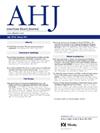Design and rationale of a pragmatic randomized clinical trial of early dronedarone versus usual care to change and improve outcomes in persons with first-detected atrial fibrillation – the CHANGE AFIB study
IF 3.5
2区 医学
Q1 CARDIAC & CARDIOVASCULAR SYSTEMS
引用次数: 0
Abstract
Background
While there are several completed clinical trials that address treatment strategies in patients with symptomatic and recurrent atrial fibrillation (AF), there are no randomized clinical trials that address first-line rhythm control of new-onset AF. Recent data suggest that early initiation of rhythm control within 1 year can improve outcomes.
Methods
In this open-label pragmatic clinical trial nested within the Get with The Guidelines Atrial Fibrillation registry, approximately 3,000 patients with first-detected AF will be enrolled at approximately 200 sites. Participants will be randomized (1:1) to treatment with dronedarone in addition to usual care versus usual care alone. The primary endpoint will be time to first cardiovascular (CV) hospitalization or death from any cause through 12 months from randomization. Secondary endpoints will include a WIN ratio (all-cause death, ischemic stroke or systemic embolism, heart failure hospitalization, acute coronary hospitalization), CV hospitalization, and all-cause mortality. Patient reported outcomes will be analyzed based on change in Atrial Fibrillation Effect on Quality of Life (AFEQT) and change in Mayo AF-Specific Symptom Inventory (MAFSI) from baseline to 12 months.
Conclusion
CHANGE AFIB will determine if treatment with dronedarone in addition to usual care is superior to usual care alone for the prevention of CV hospitalization or death from any cause in patients with first-detected AF. The trial will also determine whether initiation of rhythm control at the time of first-detected AF affects CV events or improves patient reported outcomes.
Trial Registration
- NCT05130268
为改变和改善首次发现心房颤动患者的预后而进行的早期决奈达隆与常规护理的务实性随机临床试验的设计和原理 - CHANGE AFIB 研究。
背景:虽然有几项已完成的临床试验针对有症状和复发性房颤(房颤)患者的治疗策略,但目前还没有针对新发房颤一线节律控制的随机临床试验。最近的数据表明,在 1 年内尽早开始心律控制可改善预后:在这项嵌套于 "Get With The Guidelines 心房颤动注册 "的开放标签实用临床试验中,约 200 个研究机构将招募约 3000 名首次发现房颤的患者。参与者将被随机(1:1)分配到除常规治疗外还接受决奈达隆治疗与仅接受常规治疗。主要终点是自随机治疗起 12 个月内首次心血管 (CV) 住院或因任何原因死亡的时间。次要终点将包括WIN比值(全因死亡、缺血性中风或全身性栓塞、心衰住院、急性冠心病住院)、CV住院率和全因死亡率。患者报告的结果将根据心房颤动对生活质量的影响(AFEQT)和梅奥心房颤动特异性症状量表(MAFSI)从基线到12个月的变化进行分析:CHANGE AFIB将确定在常规治疗的基础上使用决奈达隆治疗是否优于单独使用常规治疗,以预防首次发现房颤的患者因任何原因导致的冠心病住院或死亡。该试验还将确定在首次发现房颤时开始控制心律是否会影响心血管事件或改善患者报告的结果:GOV #: - NCT05130268。
本文章由计算机程序翻译,如有差异,请以英文原文为准。
求助全文
约1分钟内获得全文
求助全文
来源期刊

American heart journal
医学-心血管系统
CiteScore
8.20
自引率
2.10%
发文量
214
审稿时长
38 days
期刊介绍:
The American Heart Journal will consider for publication suitable articles on topics pertaining to the broad discipline of cardiovascular disease. Our goal is to provide the reader primary investigation, scholarly review, and opinion concerning the practice of cardiovascular medicine. We especially encourage submission of 3 types of reports that are not frequently seen in cardiovascular journals: negative clinical studies, reports on study designs, and studies involving the organization of medical care. The Journal does not accept individual case reports or original articles involving bench laboratory or animal research.
 求助内容:
求助内容: 应助结果提醒方式:
应助结果提醒方式:


